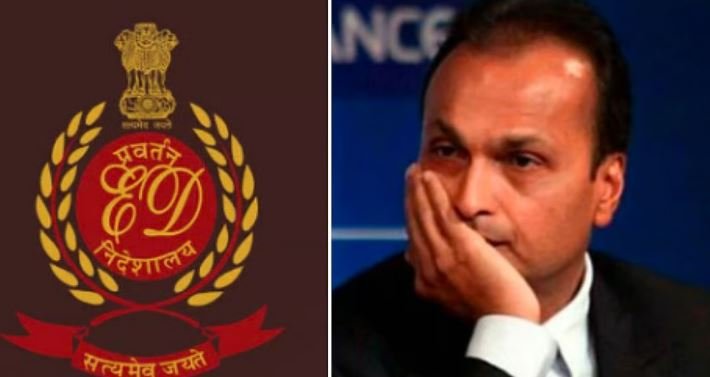Mumbai, July 26: The Enforcement Directorate’s (ED) sweeping searches against the Anil Ambani-led Reliance Group continued for the third consecutive day, intensifying the federal agency’s investigation into an alleged ₹3,000 crore bank loan fraud and suspected money laundering activities. Multiple sources within the agency confirmed that extensive raids were carried out at various offices and residences across Mumbai, targeting over 35 locations linked to approximately 50 companies and 25 individuals, including senior executives associated with Anil Ambani Group entities.
The raids, launched on July 24 under provisions of the Prevention of Money Laundering Act (PMLA), are reportedly yielding significant material, including key documents, digital data, and computer peripherals, as the agency probes financial irregularities involving large sums of public funds. The core focus of the investigation pertains to alleged loan frauds involving group firms like Reliance Communications (RCOM) and Reliance Home Finance Limited (RHFL), and the misappropriation of funds obtained from Yes Bank between 2017 and 2019.
According to ED sources, the probe is examining the possible diversion of loan amounts to shell companies, financial entities with common addresses and directors, and entities with questionable creditworthiness. Investigators are also scrutinizing allegations of backdated credit approval documents, absence of due diligence in sanctioning loans, and violations of internal banking norms—raising concerns over the propriety of the entire loan approval process at Yes Bank.
The ED is also examining potential quid pro quo arrangements, pointing to findings that Yes Bank promoters allegedly received funds through affiliated entities just before loans were sanctioned to Anil Ambani-led firms. Investigations are underway into the nature of these transactions, with suspicions of kickbacks and fraudulent intent.
Meanwhile, Reliance Power and Reliance Infrastructure, in their official statements to the stock exchanges, sought to distance themselves from the developments. They clarified that the media reports pertained to older transactions involving RCOM and RHFL and asserted that the ongoing ED action had “absolutely no impact” on their current operations, finances, or stakeholders. They also emphasized that Anil Ambani does not hold any board position in either company and reiterated that both firms have no financial or operational linkage to the entities under direct investigation.
Nonetheless, the ED continues to investigate additional angles of the alleged fraud. This includes a ₹1,050 crore loan-related fraud involving Canara Bank and RCOM, and a separate suspected fund diversion of nearly ₹10,000 crore through Reliance Infrastructure. Authorities are also tracking a network of undisclosed foreign bank accounts and overseas assets, with inputs from multiple regulatory and enforcement bodies, including the CBI, SEBI, National Financial Reporting Authority (NFRA), National Housing Bank, and Bank of Baroda.
A particularly noteworthy thread in the investigation involves Reliance Mutual Fund’s ₹2,850 crore investment in AT-1 bonds, which the agency suspects may have been part of a quid pro quo deal. These Additional Tier-1 (AT-1) bonds, often used by banks to strengthen capital reserves, are high-risk financial instruments and have come under increased scrutiny for being misused in large-scale fund mobilization.
Parliamentary disclosures by the Union Government further reveal that State Bank of India has classified RCOM and Anil Ambani as ‘fraud’, and the bank is reportedly preparing to file a formal complaint with the Central Bureau of Investigation (CBI).
While the companies in question continue to maintain that current operations remain unaffected and legally insulated from the matters under investigation, the widening probe is expected to bring greater regulatory scrutiny on corporate governance practices and financial accountability within major Indian conglomerates. The ED has not ruled out more seizures or arrests as the case progresses.




